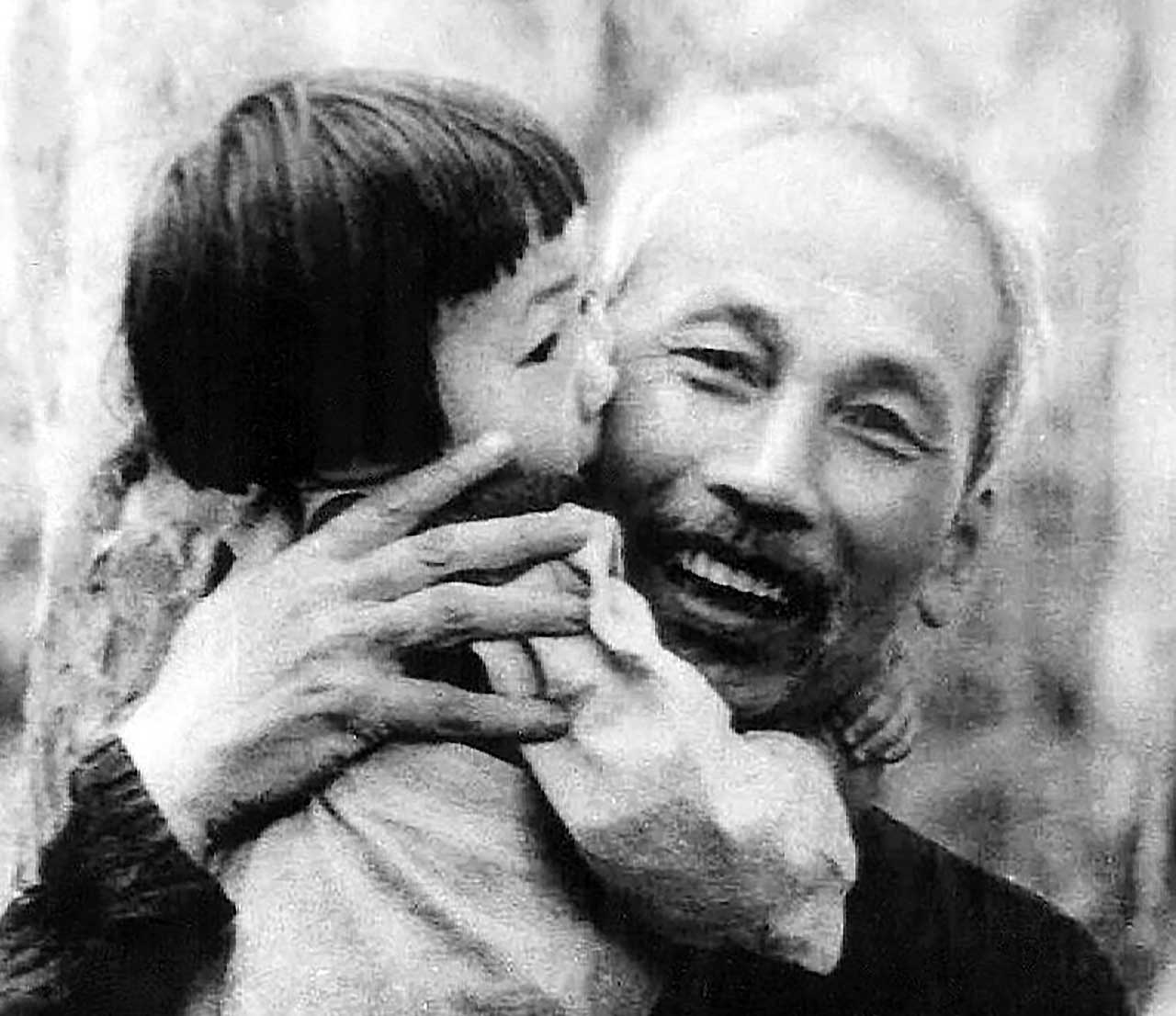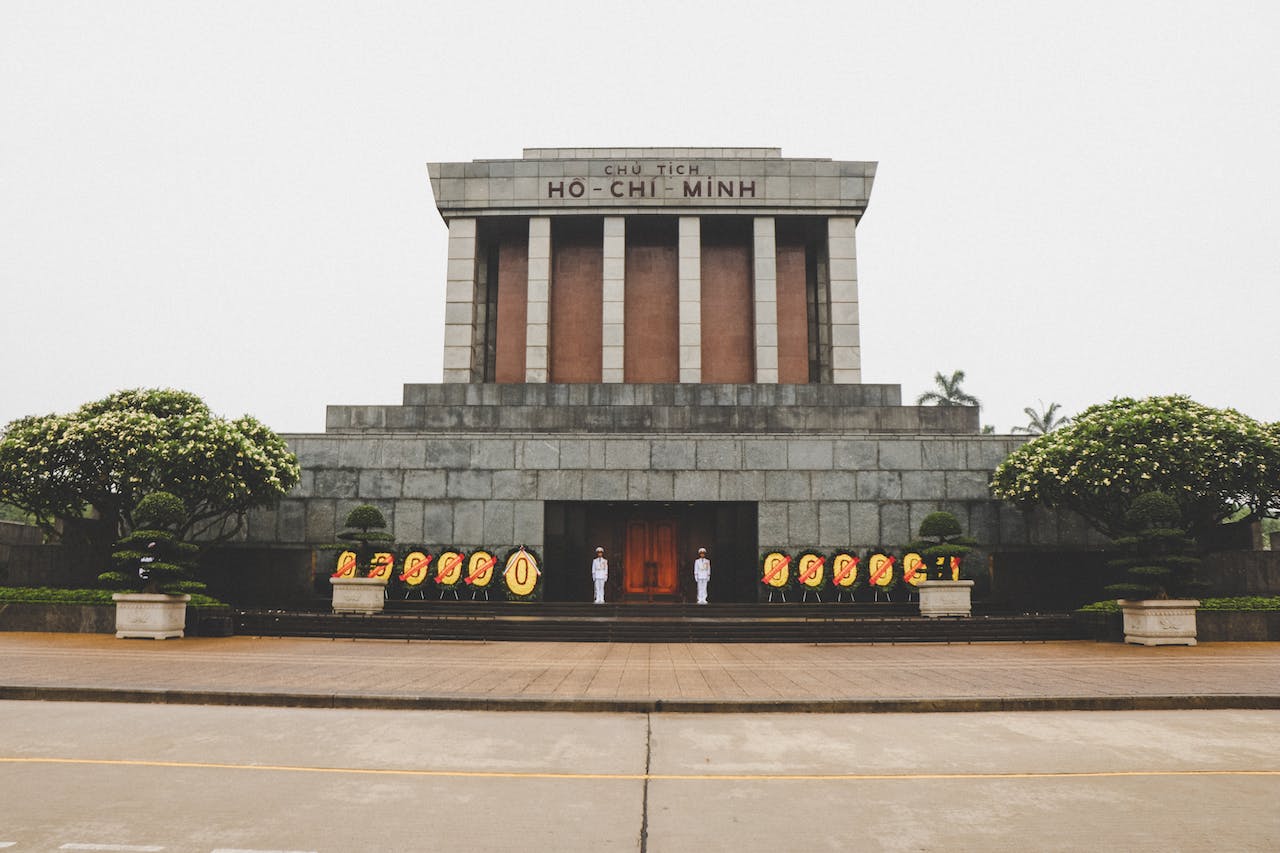Nestled in the heart of Hanoi, the Ho Chi Minh Mausoleum stands as a solemn and iconic monument dedicated to one of Vietnam’s most revered figures, Ho Chi Minh. Often referred to as “Uncle Ho” by the Vietnamese people, Ho Chi Minh played a pivotal role in the nation’s tumultuous history, leading the country through times of colonialism, war, and ultimately to independence. In this article, we will explore the significance of the Ho Chi Minh Mausoleum and the remarkable accomplishments of Ho Chi Minh in his pursuit of a unified and independent Vietnam.
The Ho Chi Minh Mausoleum: A Tribute to a Revolutionary Icon
The Ho Chi Minh Mausoleum, an imposing structure made of grey stone and located in the historic Ba Dinh Square, is a place of great reverence for the Vietnamese people. The mausoleum serves as the final resting place for Ho Chi Minh’s embalmed body, carefully preserved for visitors to pay their respects. It was inaugurated on August 29, 1975, in honor of Ho Chi Minh’s immense contributions to Vietnam.
The mausoleum’s architecture is notable for its simplicity and symmetry, symbolizing the modesty and integrity of Ho Chi Minh himself. As visitors approach the mausoleum, they pass by guards in crisp white uniforms, and the entire atmosphere is one of solemnity and respect.
Inside the mausoleum, Ho Chi Minh’s body lies in a glass sarcophagus, surrounded by dim lighting. Visitors are required to maintain silence and follow strict dress codes while inside. It is customary for both locals and international visitors to offer a solemn salute to Uncle Ho’s preserved body.
The Life and Legacy of Ho Chi Minh
Ho Chi Minh, born Nguyen Sinh Cung in 1890, was a revolutionary leader who dedicated his life to the cause of liberating Vietnam from colonial rule and establishing a unified, independent nation. His journey was filled with struggle, resilience, and an unwavering commitment to the well-being of his people. Here are some of the key aspects of his life and his contributions to Vietnam:
- Early Years and Overseas Activism: Ho Chi Minh’s early years were marked by his experiences as a traveling scholar and laborer in various countries. He worked as a baker, a cook, and even as a seaman, which exposed him to different cultures and political ideologies. He adopted the name “Nguyen Ai Quoc” (Nguyen the Patriot) during his time in France, where he became involved in revolutionary activities.
- Founding of the Indochinese Communist Party: Ho Chi Minh played a crucial role in the founding of the Indochinese Communist Party in 1930, marking the beginning of his commitment to the communist ideology. He saw communism as a means to liberate Vietnam from colonial oppressors.
- Declaration of Independence: In September 1945, following the end of World War II, Ho Chi Minh proclaimed Vietnam’s independence from French colonial rule. His famous speech, delivered in Hanoi, was inspired by the principles of freedom and self-determination outlined in the U.S. Declaration of Independence. This pivotal moment in Vietnam’s history laid the foundation for the struggle against French colonial forces.
- First Indochina War: Ho Chi Minh led the Viet Minh, a communist-led resistance organization, in a prolonged and brutal conflict against French colonial rule, known as the First Indochina War. The war eventually led to the signing of the Geneva Accords in 1954, which divided Vietnam into North and South, with the intention of holding elections for reunification in 1956. However, these elections never took place, setting the stage for the Vietnam War.
- Vietnam War and Unification: Ho Chi Minh continued to lead North Vietnam in the Second Indochina War, commonly known as the Vietnam War, against the United States and its allies. His unwavering determination and leadership were instrumental in the eventual reunification of North and South Vietnam in 1976, following the withdrawal of American troops.
- Cultural and Social Reforms: Ho Chi Minh was not only a revolutionary leader but also a proponent of social and cultural reforms. He sought to modernize Vietnamese society and eliminate oppressive social structures. His land reforms and education initiatives aimed to empower the rural population and reduce inequality.
- International Influence: Ho Chi Minh’s leadership and the Vietnamese struggle for independence garnered international support and solidarity. He remains a revered figure in countries around the world for his role in the fight against colonialism and imperialism.

Ho Chi Minh’s Enduring Legacy
The legacy of Ho Chi Minh extends far beyond the boundaries of Vietnam. His unwavering commitment to the principles of independence, self-determination, and social justice has left an indelible mark on the country and the world. Here are some key elements of his enduring legacy:
- Symbol of Unity: Ho Chi Minh is regarded as a unifying figure in Vietnam’s history. He played a crucial role in bringing together a nation torn by colonialism and war. His dedication to national unity and independence has left a lasting impact on the country’s identity.
- Revolutionary Icon: Ho Chi Minh is celebrated as a symbol of resistance and determination against foreign aggression. His commitment to the cause of Vietnamese independence inspired generations of revolutionaries and freedom fighters worldwide.
- Preservation of Culture: Ho Chi Minh’s efforts to modernize and educate the population also included the preservation of Vietnam’s cultural heritage. His influence can be seen in the country’s arts, literature, and education.
- International Solidarity: Ho Chi Minh’s fight against colonialism and imperialism resonated with many nations and individuals around the world. His legacy continues to inspire movements for self-determination and social justice globally.
- Cultural Heritage: The Ho Chi Minh Mausoleum, as well as the surrounding Ho Chi Minh Complex, serves as a center for cultural and historical education in Vietnam. Visitors from around the world come to learn about the life and work of this remarkable leader.
While Ho Chi Minh’s political ideologies and policies have generated diverse opinions, there is no denying the impact he had on Vietnam’s history. His dedication to the welfare of the Vietnamese people and the pursuit of an independent, unified nation has solidified his place as one of the most influential figures in Vietnamese history.
Visiting the Ho Chi Minh Mausoleum
For those interested in paying their respects and learning more about Ho Chi Minh’s life and legacy, the Ho Chi Minh Mausoleum is open to visitors. Here are some essential details for planning a visit:
- Location: The Ho Chi Minh Mausoleum is situated in Ba Dinh Square, in the heart of Hanoi, Vietnam.
- Opening Hours: The mausoleum is typically open in the mornings, and visitors are encouraged to check the operating hours before planning their visit, as it may vary.
- Dress Code: There is a strict dress code for entering the mausoleum. Visitors are required to dress modestly, with no shorts, sleeveless shirts, or revealing clothing. Additionally, hats and sunglasses should be removed before entering.
- Photography: Photography is not allowed inside the mausoleum, and visitors should maintain a respectful and solemn demeanor during their visit.
- Security: There are security checks at the entrance, so it’s advisable to bring minimal personal belongings and be prepared for a thorough inspection.
- Prohibitions: Food, drinks, and other personal items are not allowed inside the mausoleum.
Visiting the Ho Chi Minh Mausoleum is an opportunity to pay tribute to a leader who played a pivotal role in shaping Vietnam’s history. It is a place where one can gain a deeper understanding of the sacrifices, resilience, and ideals that are woven into the fabric of the nation.
Honoring the Legacy of Ho Chi Minh
The Ho Chi Minh Mausoleum stands as a symbol of remembrance, a place where Vietnamese and international visitors alike pay homage to a man who dedicated his life to the cause of independence and self-determination. Ho Chi Minh’s contributions to Vietnam’s history are immeasurable, and his influence continues to resonate with those who seek justice, freedom, and the pursuit of a better world.
Visiting the mausoleum provides a glimpse into the life and times of this remarkable leader and serves as a testament to the enduring legacy of Ho Chi Minh, who remains an iconic figure in the hearts of the Vietnamese people and a symbol of hope for all who aspire to overcome adversity and injustice.
For more information about Ho Chi Minh’s influence during the Vietnam War, enjoy a walkthrough of the General Command Headquarters Bunker located in Hanoi.
Featured Image & Source: Ho Chi Minh Mausoleum in Hanoi, Vietnam | Photo by Hugo Heimendinger
Read more Vietnam travel articles.

